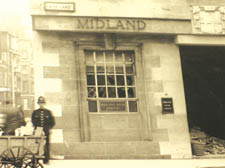| |

A policeman outside the Midland Bank in Park Lane after a bomb exploded nearby in June 1939 |
The hero toilet attendant who saved Oxford Circus from deadly bombers
Public Record Office papers show how cleaner defused device
A balmy Saturday night in the summer of 1939 and Thomas Hawkett was scrubbing toilets in Oxford Circus Tube station, just as he did every Saturday, when he made a chance discovery of a brown paper package stuffed in one of the water closets.
Carefully unwrapping the parcel, the Marylebone Borough Council lavatory attendant found eight sticks of ammon gelignite – more commonly known as dynamite.
A wrong move and London’s busiest Tube station, and hundreds of Saturday night revellers passing through it, could go up in smoke.
But as the once-secret files just released by the Public Record Office in Kew show, Mr Hawkett switched from toilet scrubber to quick-thinking bomb defuser in the blink of an eye – averting bloodshed and winning a commendation of the highest order on a night when the West End came under siege.
Police correspondence and witness accounts taken from that Saturday night, June 24, when three suspected IRA bombs brought pandemonium to Piccadilly Circus, reveal an other act of courage from a police inspector who foiled a second bomb amid the chaos of the first explosion.
The blitz started shortly before 10pm as post-Depression central London was in full swing.
James Bastow was walking along Glass-house Street with a friend when he saw something “burning” on the pavement.
“It looked like a brown paper parcel and it was all in flames,” he told the police. “We were only about six yards away when people started shouting ‘it’s a bomb’. No sooner had we started running than it exploded.”
The 17-year-old paperboy lost an eye in the explosion as glass rained down. Victims were slumped on the floor and an angry “lynch mob” of vigilantes were rounding up anyone they suspected of being behind the act.
This was the scene that greeted Inspector Robert Fabian, who had rushed from nearby Vine Street police station after hearing the explosion. Clambering among the rubble and debris, Inspector Fabian came across a second brown parcel. He unwrapped the parcel and began to dismantle the dynamite sticks from the fuse, placing the explosives in his pocket and warding off the crowd.
His efforts, for which he received acid burns to his hands and face, prevented a second explosion which would have almost certainly claimed lives.
Little over a quarter of a mile away, Mr Hawkett, the humble toilet cleaner, was oblivious to the chaos as he stumbled across the package. He picked it up, dumped it in a bucket of water and hosed it down. He stood over it and watched as the fuse and charge floated to the surface.
Two further bombs exploded that night – one outside Lloyds Bank in Piccadilly and another outside the Midland Bank in Park Lane. The bombs caused more than £1,000 damage – a large sum at the time. But the toll of destruction could have been so much worse were it not for Mr Hawkett and Inspec sto sr Fabian.
In a letter to the police commissioner, Chief Constable Howell praises the “commendable and meritorious conduct of a lavatory attendant”.
Both Inspector Fabian and Mr Hawkett received cash rewards.
Although no one was ever charged with the offences, police believe that the explosions were the work of the IRA as part of a bombing campaign in the capital that only halted with the start of the Second World War. |
 |
|
| |
| |